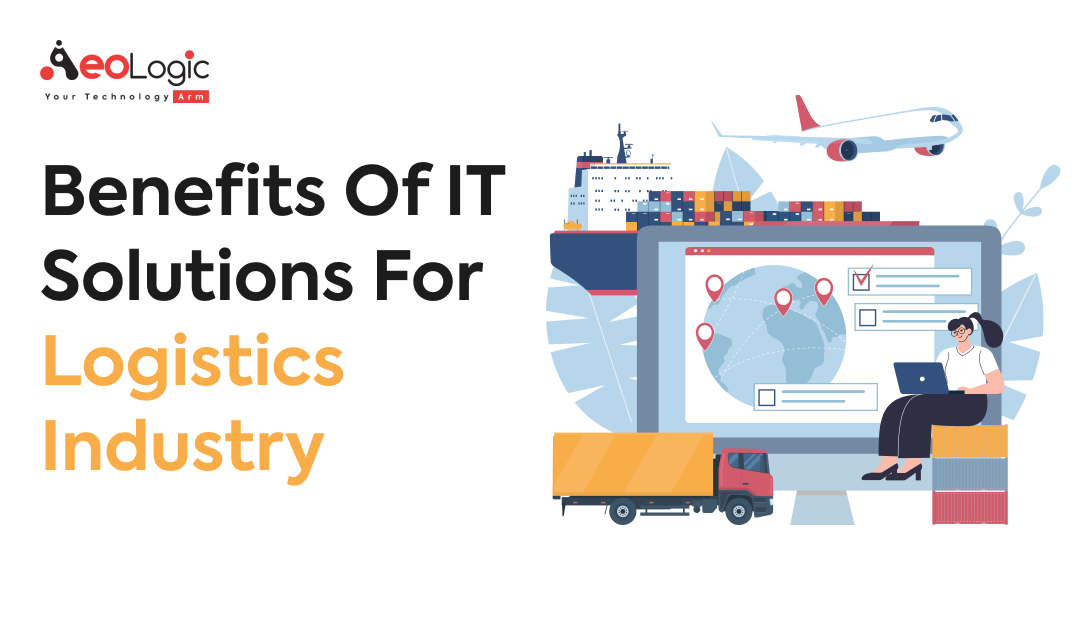The logistics industry, the backbone of global trade, is undergoing a monumental transformation, fueled by technological advancements. With the rise of e-commerce and an increasingly connected world, the pressure on logistics to be faster, more efficient, and transparent has never been higher. In this landscape, Information Technology (IT) solutions are not just beneficial; they are essential. IT solutions for logistics industry have become a pivotal component in redefining how goods are moved and managed around the globe.
1. Streamlined Operations
Efficiency is the heart of logistics, and IT solutions are the pacemaker. By integrating complex algorithms and machine learning, IT solutions can:
- Optimize route planning, reducing fuel consumption and delivery times.
- Improve warehouse management, enabling faster turnover and better space utilization.
- Automate data entry and processing, cutting down on human error and administrative overhead.
These optimizations lead to tangible benefits. According to a study by MHI, nearly 50% of logistics providers noted a significant boost in efficiency thanks to digital technologies.
Also Read: Benefits of RFID in Supply Chain Management and Logistics
2. Enhanced Transparency
Gone are the days when packages would vanish into a logistical black hole. IT solutions bring unprecedented levels of transparency to logistics, allowing:
- Real-time tracking of shipments, giving customers peace of mind.
- Better inventory management, ensuring products are in stock and accounted for.
- Proactive response to delays or issues, maintaining trust and reliability.
This visibility isn’t just for customer satisfaction; it’s also about performance. The use of IT for tracking and monitoring has been linked to a 5% increase in on-time deliveries, as reported by a logistics technology survey.
3. Cost Reduction
Reducing costs while maintaining quality is the balancing act of logistics. IT solutions tip the scales in favor of savings by:
- Decreasing manual labor through automation, directly cutting costs.
- Lowering error rates in inventory and delivery, preventing expensive oversights.
- Enhancing asset utilization, ensuring every dollar spent on assets like trucks and warehouses is used effectively.
For instance, a study by Inbound Logistics highlighted that companies using IT solutions for inventory management saw a 25% reduction in inventory holding costs.
Trending Blog: The Benefits of RFID Every Retailer Should Know
4. Customer Satisfaction
In the age of instant gratification, customer expectations are sky-high. IT solutions for logistics industry cater to these demands by:
- Providing faster delivery options through optimized operations.
- Offering detailed tracking and proactive communication.
- Ensuring product availability through better inventory management.
This leads to higher customer retention and satisfaction. According to a survey by Capgemini, businesses that invest in customer experience technology can expect a 20% increase in customer satisfaction.
5. Sustainability
Sustainability is no longer a choice; it’s a necessity. IT solutions assist logistics companies in becoming more environmentally friendly by:
- Optimizing routes for lower emissions.
- Reducing waste through improved inventory accuracy.
- Encouraging a paperless environment with digital documentation.
The Global Logistics Emission Council states that route optimization can lead to a reduction in CO2 emissions by up to 30% for logistics operations.
6. Agility and Scalability
The only constant in logistics is change. IT solutions offer the agility and scalability required to adapt by:
- Allowing rapid adjustments to operations in response to market changes.
- Scaling up or down with ease, aligning with demand fluctuations.
- Integrating with new technologies and platforms as they emerge.
An IBM report suggests that companies leveraging agile practices in their supply chain have seen a 4.7% increase in year-over-year revenue growth.
7. Risk Management
Every shipment carries risk, but IT solutions for logistics industry help mitigate these dangers by:
- Providing predictive analytics for better decision-making.
- Enhancing security with advanced cybersecurity measures.
- Offering backup and recovery systems to ensure business continuity.
A study by The Journal of Commerce indicated that IT adoption in risk management led to a 30% decrease in operational downtime for logistics companies.
Also Read: Benefits of RFID in Asset Tracking Management for the Navy
8. Data-Driven Decision Making
In a world driven by data, logistics isn’t lagging. The benefits of IT solutions for logistics industry are amplified by their ability to harness data for informed decision-making. IT solutions provide:
- Advanced analytics that predict market trends, helping companies stay ahead of the curve.
- In-depth insights into customer behavior, enabling personalized service offerings.
- Strategic planning tools that turn data into actionable strategies for growth.
For example, a DHL report revealed that 81% of industry professionals believe that data-driven decision-making is crucial to supply chain activities, leading to smarter, more informed strategies that propel companies forward.
9. Integration and Collaboration
No logistics provider is an island, and IT solutions are the bridge between them. These technologies foster integration and collaboration by:
- Enabling seamless communication across the supply chain, from suppliers to end consumers.
- Creating shared platforms where multiple stakeholders can synchronize their operations.
- Encouraging partnerships that lead to innovative solutions and new business models.
This collaborative approach is backed by research from Accenture, which suggests that collaborative supply chain models can increase profitability by up to 50% for participating companies.
10. Talent Management
As IT solutions take over repetitive tasks, the logistics workforce is evolving. IT empowers talent management by:
- Training employees on high-value tasks, enhancing job satisfaction and productivity.
- Providing tools for better workforce management, including scheduling and task allocation.
- Attracting tech-savvy talent to innovate within the industry.
In fact, a report from the World Economic Forum highlights that the adoption of digital workflows in logistics could create up to 1.4 million new jobs by 2030, as the industry demands a more skilled workforce.
Also Read: How RFID Tagging Solutions for Ammunition Will Help the Soldiers
11. Continuity and Resilience
Finally, in a world where disruptions are the norm, the reliability provided by IT solutions for logistics industry is invaluable. These systems ensure continuity and resilience by:
- Facilitating rapid response to global disruptions like pandemics or trade wars.
- Ensuring data integrity and accuracy, critical in times of crisis.
- Providing scenario planning tools to prepare for and manage potential disruptions.
The MIT Center for Transportation & Logistics supports this, stating that companies with resilient supply chains have a 15% faster response time to market disruptions and recover up to 3 times faster than their less-prepared competitors.
Final Words
The logistics industry stands at a crossroads, with technology paving the way forward. The benefits of IT solutions for logistics industry are not just numbers on a balance sheet; they represent a fundamental shift towards a smarter, more connected, and sustainable global trade ecosystem. As businesses continue to navigate the complexities of modern commerce, the integration of IT solutions in logistics is no longer an option—it’s a strategic imperative. The revolution is here, and it’s digital.
Embark on your journey towards a smarter, more efficient logistics operation with Aeologic Technologies, where innovative IT solutions meet industry expertise.

I’m Deepika Pandey, an SEO strategist and content writer with 6+ years of experience. I create SEO-friendly content that drives traffic and engages readers. I combine data insights with creativity to help businesses grow their online presence effectively.





